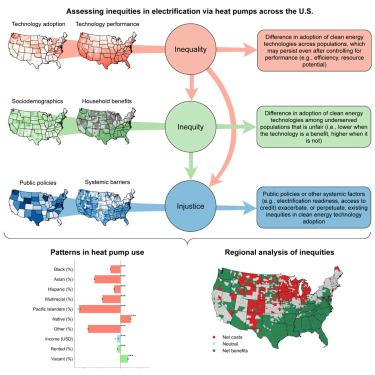Our official English website, www.x-mol.net, welcomes your
feedback! (Note: you will need to create a separate account there.)
Assessing inequities in electrification via heat pumps across the US
Joule ( IF 38.6 ) Pub Date : 2024-10-18 , DOI: 10.1016/j.joule.2024.09.012 Morgan R. Edwards, Jaime Garibay-Rodriguez, Jacob Shimkus Erickson, Muhammad Shayan, Jing Ling Tan, Xingchi Shen, Yueming Qiu, Pengfei Liu
Joule ( IF 38.6 ) Pub Date : 2024-10-18 , DOI: 10.1016/j.joule.2024.09.012 Morgan R. Edwards, Jaime Garibay-Rodriguez, Jacob Shimkus Erickson, Muhammad Shayan, Jing Ling Tan, Xingchi Shen, Yueming Qiu, Pengfei Liu

|
Heat pumps are an energy-efficient and increasingly cost-effective solution for reducing greenhouse gas emissions in the building sector. However, other clean energy technologies, such as rooftop solar, are less likely to be adopted in underserved communities, and thus policies incentivizing their adoption may funnel support to well-resourced communities. Unlike previously studied technologies, the effects of heat pumps on household energy bills may be positive or negative depending on local climate, energy costs, building features, and other factors. Here, we propose a framework for assessing heat pump inequities across the US. We find that households in communities of color and with higher percentages of renters are less likely to use heat pumps across the board. Moreover, communities of color are least likely to use heat pumps in regions where they are most likely to reduce energy bills. Public policies must address these inequities to advance beneficial electrification and energy justice.
中文翻译:

评估美国各地通过热泵实现电气化的不平等现象
热泵是一种节能且越来越经济高效的解决方案,用于减少建筑领域的温室气体排放。然而,其他清洁能源技术,如屋顶太阳能,不太可能在服务不足的社区采用,因此鼓励采用这些技术的政策可能会向资源丰富的社区提供支持。与以前研究的技术不同,热泵对家庭能源账单的影响可能是积极的或消极的,具体取决于当地的气候、能源成本、建筑特色和其他因素。在这里,我们提出了一个评估美国热泵不平等现象的框架。我们发现,有色人种社区和租房者比例较高的家庭不太可能全面使用热泵。此外,有色人种社区最不可能在最有可能减少能源费用的地区使用热泵。公共政策必须解决这些不平等问题,以促进有益的电气化和能源正义。
更新日期:2024-10-18
中文翻译:

评估美国各地通过热泵实现电气化的不平等现象
热泵是一种节能且越来越经济高效的解决方案,用于减少建筑领域的温室气体排放。然而,其他清洁能源技术,如屋顶太阳能,不太可能在服务不足的社区采用,因此鼓励采用这些技术的政策可能会向资源丰富的社区提供支持。与以前研究的技术不同,热泵对家庭能源账单的影响可能是积极的或消极的,具体取决于当地的气候、能源成本、建筑特色和其他因素。在这里,我们提出了一个评估美国热泵不平等现象的框架。我们发现,有色人种社区和租房者比例较高的家庭不太可能全面使用热泵。此外,有色人种社区最不可能在最有可能减少能源费用的地区使用热泵。公共政策必须解决这些不平等问题,以促进有益的电气化和能源正义。































 京公网安备 11010802027423号
京公网安备 11010802027423号